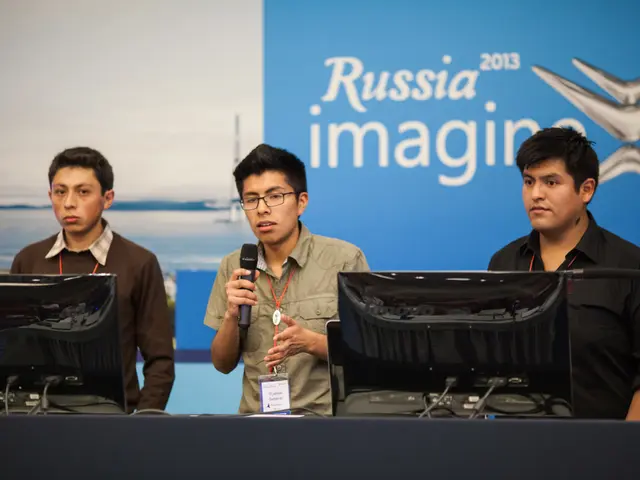Pondering Over Panic: Artificial Intelligence and the Evolution of Employment
Fresh Article:
In a recent ride at Phoenix airport, a taxi driver discussed the impending rise of AI and its potential impact on human employment. He voiced concerns that in the AI-dominated future, humans would be left jobless and penniless. I could've debated the numerous benefits AI brings to vital sectors like healthcare and manufacturing (as mentioned in Manufacturers Alliance's recent report titled "Manufacturing Intelligence"). However, there are significant concerns about AI, particularly in the wrong hands, such as increased cyber threats and the rise of deep fakes. But job losses aren't my primary worry.
Instead, I'm more focused on Polanyi's Paradox - the idea that humans have knowledge that goes beyond what we can express. This paradox explains the limitations of AI imitating certain critical human skills.
Let's delve into that a bit more. Fears of technology replacing human jobs have been around for centuries. Luddites, 19th-century English textile laborers, wrecked any new machinery bought by factory owners out of fear of automation. Despite advancements in technology, job losses never materialized. In fact, technological advancements have generally complemented, not hindered, human labor.
Take the banking sector, for example. The increased use of ATMs between 1980 and 2010 led to a leap in their number, but the opposite happened to the employment rate in banks. Instead, the automation of cash-handling tasks increased data collection on customers and opened new avenues for banks to get involved in relationship banking. Tellers morphed into sales representatives.
But isn't AI different? It may help blue-collar jobs, but AI will overtake professional roles that demand complex thought processes. As Pew Research Center researcher Rakesh Kochhar noted, AI is encroaching upon the office spaces of white-collar workers. Particularly jobs involving data analysis, financial reporting, and repetitive administrative tasks. However, history has shown us that similar predictions have been proven wrong in the past.
The Paradox of Knowledge
What AI can and cannot achieve stems from Polanyi's Paradox. In the 1960s, Michael Polanyi hypothesized that there are types of knowledge we cannot communicate effectively, such as emotions, creativity, and wisdom. If you can't express it, you can't program it, and therefore, you can't replicate it in AI.
Human activities rely heavily on implicit knowledge. For example, a film critic may express difficulty explaining the difference in style between the works of Monet and Degas, while a psychologist may struggle to describe the nuances between various psychological disorders. Similarly, a CEO may find it challenging to articulate the reasoning behind a business decision, and an HR professional can't always explain why they believe a candidate is the best fit for a job.
This challenge is evident in a joint study to be published this May by the Manufacturers Alliance Foundation and American Fidelity. While HR experts in the manufacturing sector are embracing AI to aid in recruitment and onboarding efforts, they express concerns about the risks of bias. They also believe that human intuition, psychological wisdom, and empathy are vital components that AI cannot replicate and that are necessary for an HR professional to truly serve their employer effectively.
The Triumph of AI vs. Emotional Connection
AI may triumph in defeating humans at games like chess, yet it cannot replicate the human experience, the excitement of victory, or our fundamental need for connection. This emotional element stems from human consciousness, a complex aspect of human existence encompassing cultural, biological, and behavioral evolution and the foundation of labor in our societal structure. Programming consciousness is not within our reach, despite the wealth of literature and research that exists on the subject.
While AI may threaten jobs like taxi driving, it should give us confidence in the adaptability of humans and the beneficial impact of technology on our lives over time. Despite the most pessimistic of predictions, history has shown us that technology improves, rather than diminishes, the quality of life.
- The taxi driver's concerns about AI, as discussed in the recent airport ride, are not unfounded, given the potential risks associated with technology, especially when it falls into the wrong hands, such as kleptocrats, who could exploit these advancements to heighten cyber threats and the proliferation of deep fakes.
- As the joint study by the Manufacturers Alliance Foundation and American Fidelity this May suggests, AI, while effective in aiding recruitment and onboarding efforts in HR, cannot replicate human intuition, psychological wisdom, and empathy – key components necessary for HR professionals to serve their employers effectively, hence the expressed concerns about the risks of bias.
- While AI may outperform humans in tasks involving complex thought processes and repetitive administrative tasks, as suggested by Rakesh Kochhar of the Pew Research Center, there remains a significant gap in AI's ability to replicate the emotional element of human interaction, such as the excitement of victory or our fundamental need for connection, which stems from human consciousness, a complex aspect of human existence.




